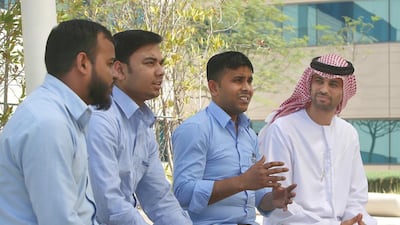Melanie Swan
ABU DHABI // Students at Zayed University have found that a smile goes a long way when showing appreciation for the people who help keep their campus working, but an email goes further.
As part of the Give Back project, staff and students have been getting to know the painters, cleaners, cooks, gardeners and other men who work behind the scenes at the Abu Dhabi campus by teaching them IT skills so they can communicate with loved ones back home.
The voluntary term-long classes, which began last month and are sponsored by the Ministry of Presidential Affairs, mean the men, mainly from South Asia, learnt how to send emails, photos and videos.
Brione LaThrop explained that the project aimed to promote social responsibility among students, with some travelling to refugee camps around the region.
Each project included between 12 and 20 students.
Shaima Al Hajjri, one of the university’s alumni who helped coordinate the IT project, said they wanted to give back to the labourers and help them learn.
“We wanted them to be able to study but have fun at the same time. We also wanted them to get to know us and for us to get to know them and see we are all the same,” said the 27-year-old.
“We want to reduce the gaps between the students and the labourers and show that we appreciate everything they do for us. The interaction between us has changed. We know and understand each other better and feel more like friends.”
Ms LaThrop said the results have been “heart warming” but also “disheartening” as the staff and youngsters got to know the stories of the men working at the university.
“The girls asked the labourers to write down their dreams because they wanted to see if they could help fulfil those dreams. One said he doesn’t have dreams, that he works hard and doesn’t have time.”
Ms Al Hajjri explained that instead of possessions like a new phone or more money, many of the men wanted simpler, more spiritual things.
“We were shocked that they just wanted simple things like to go to Haj or Umrah, to be with their family. We were really impressed,” she said.
“The thing we’ve learnt is that they need to be able to send emails as it’s really important for them to be in touch with their families.”
The students will soon teach the university’s workers how to use other media such as Skype and Snapchat and hoped to be able to provide smartphones to those who do not own one.
Mohammed Syed Ali, 28, from Bangladesh, said the project has been “like reliving our school days” and said “we feel very happy”.
He said there were fewer barriers now. “It’s easier to talk with the students now. We feel more comfortable.”
Mohammed Merij, 21, also from Bangladesh, said before the project he and his fellow workers were worried about interacting with the students.
“There was a lot more fear of the girls, but I feel people are nicer to us now. They talk to us more. When we smile at them, they smile back at us.”
Ibrahim Al Hashimi, the campus facilities development manager, has also noticed big changes in the short time since the project began.
“They’ve broken the ice doing this,” he said.
“Previously they’d walk past the students with their heads down and move out of the way. Now, they’ll walk with their heads up and smile. There’s a real difference. It’s helped break the barrier and the ice a lot.”
mswan@thenational.ae

